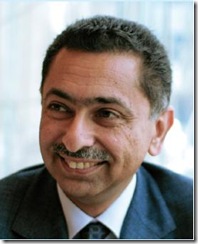Ihab Ghattas is a telecoms veteran in the Middle East region, having spent nearly 30 years working for the UAE’s incumbent operator Etisalat. In a new role as Huawei’s chief business development officer for MENA, he discusses with Michelle Mills the difference in the dynamic between working within a service provider from that of working within an equipment supplier, identifying insightful trends along the way

I know the network of the UAE like the back of my hand, because I built it,” declares Ghattas. The Egyptian national worked for Etisalat for almost 28 years where his responsibilities included introducing Next Generation Networks to the UAE, implementing wireline and wireless projects and assisting in the acquisition of Pakistan’s PTCL.
He believes this vast experience helps in his latest role with Huawei in understanding the needs of his clients. Having joined the Chinese equipment manufacturer in March 2007, Ghattas is based in Dubai and spends much of his time establishing key relationships with operators across the MENA region, as well as introducing enterprise solutions to non-telecommunications businesses.
“When I joined Huawei I changed my job in three ways: from operator to vendor, from Arab culture to Chinese culture and from technical management domains to business development, marketing and PR,” he says.
Ghattas states that the oil and gas sector, smart cities and e-government are amongst a number of areas that present exciting growth opportunities for Huawei.
With the high price for oil and gas, companies in the sector are looking to upgrade their telecommunications networks and explore new ways of connecting remote headquarters, offshore oil rigs and the ships that move between them. There are many access technologies that can be utilised in such environments, WiMAX being one alternative.
“Communication is now point-to-point, but with WiMAX you could be on a ship and move around and still have connectivity. You could take your laptop and your phone and still connect to the Internet, use voice over IP – as you travel between the oil rigs you would not lose reception,” Ghattas contends.
However, there are challenges with WiMAX with regards frequency allocations and regulations, so Huawei is turning to IP networks, campus applications and transmissions as alternative communication technologies in the oil and gas sector.
Smart, connected real estate developments or economic cities such as Palm Jumeirah or Bahrain Financial Harbour clearly require comprehensive telecoms networks. Huawei is in discussions with five or six developers in the region that have significant communications requirements.
“The developments are being created with a completely different mindset.
The developers want to have their own communication networks and data systems in place, they want their own technology inside to be able to control security, to control the movement of cars and to offer business centres or on-campus communications,” he comments.
Ghattas also notes that operators in the region are increasingly considering the issue of ‘green’ technology and practices within the framework of available rules and regulations. He believes once operators realise the cost benefits involved in ‘going green’, there will be a much larger uptake.
Huawei has been a pioneer in developing environmentally-friendly innovations in an attempt to address global climate concerns, and it has made energy conservation and emission reduction a key part of its technical and financial strategy. Examples are ‘green’ base stations and a unified 2G/3G core network that reduces power consumption by 20 per cent, but without losing any coverage. Huawei’s ‘green’ broadband network helps to reduce an operator’s energy use by 30 per cent in three years, the supplier claims.
“In our office we are doing our best to promote the concept for the [economic] benefit of the operators, as well as the environment. However, we also have to remember that it is a collective effort between all vendors and operators,” Ghattas asserts.
“If you want to see a major change in the region then others also have to push, but it may not be on their agenda or they may not have the products to offer. We offer ‘green’ products as much as it is practically possible.”





0 comments ↓
There are no comments yet...Kick things off by filling out the form below.
Leave a Comment